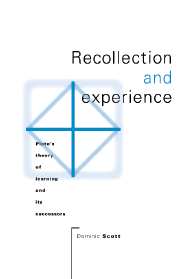Book contents
- Frontmatter
- Contents
- Acknowledgements
- Abbreviations
- GENERAL INTRODUCTION
- SECTION I PLATONIC RECOLLECTION
- SECTION II ARISTOTELIAN EXPERIENCE
- Introduction
- 3 The rejection of innatism
- 4 Levels of learning
- 5 Discovery and continuity in science
- 6 Discovery and continuity in ethics
- Appendix to Section II – Perception of the Universal
- SECTION III HELLENISTIC CONCEPTS
- SECTION IV INNATISM IN THE SEVENTEENTH CENTURY
- CONCLUSION
- Bibliography
- Index of ancient passages
- General index
Introduction
Published online by Cambridge University Press: 03 December 2009
- Frontmatter
- Contents
- Acknowledgements
- Abbreviations
- GENERAL INTRODUCTION
- SECTION I PLATONIC RECOLLECTION
- SECTION II ARISTOTELIAN EXPERIENCE
- Introduction
- 3 The rejection of innatism
- 4 Levels of learning
- 5 Discovery and continuity in science
- 6 Discovery and continuity in ethics
- Appendix to Section II – Perception of the Universal
- SECTION III HELLENISTIC CONCEPTS
- SECTION IV INNATISM IN THE SEVENTEENTH CENTURY
- CONCLUSION
- Bibliography
- Index of ancient passages
- General index
Summary
The next four chapters will consider Aristotle's theory of learning. We begin in chapter 3 by determining his attitude to innatism and then, in chapters 4–6, look at his theory specifically in the light of our revised understanding of Platonic recollection. This revised view of Plato's theory raises two particularly relevant questions. The first concerns the distinction between ordinary and higher levels of learning. We have just seen how Plato's theory was directed exclusively at higher learning and that although he did have an empiricist account of ordinary learning he showed no interest in developing it. Now, there can be no doubt that in the post-Aristotelian era, Epicurus and the Stoics had a strong interest in the formation of ordinary concepts. This leaves an important question-mark hanging over Aristotle himself. Was it he who introduced the topic to philosophy, or do we have to wait for Epicurus to put it on the agenda?
We shall tackle this issue in chapter 4. One of the most famous passages in Aristotle's works is the last chapter of the Posterior Analytics, which explains how we grasp the universal by progressing from perception, memory and experience. There is, however, a controversy about the interpretation of this passage, a controversy that shows striking parallels to the debate about Platonic recollection. Is Aristotle here trying to explain ordinary concept formation, or is he talking about the discovery of scientific first principles, or both? Chronologically, Aristotle stands between Plato's indifference to questions about ordinary learning and the Hellenistic fascination with them; this therefore gives the controversy about this passage added importance.
- Type
- Chapter
- Information
- Recollection and ExperiencePlato's Theory of Learning and its Successors, pp. 89 - 90Publisher: Cambridge University PressPrint publication year: 1995



